Positive ripple effect for World Water Day 🌎💧
Discover how collective action can make waves of change.
Banner photo features Bock’s Lake, YT. Courtesy of Martina Volfova, 2023 Lake Biodiversity Photo Challenge.
Did you know that the average person in Canada uses 335 litres of water per day? For drinking, cooking, bathing, laundry, cleaning and toilet flushing, we all depend on water. We also know that finite freshwater sources are under increasing pressure.
For World Water Day, March 22nd, we’re taking this time to celebrate the power of collective action in driving change. From water science to stewardship, every endeavour creates an impactful ripple effect. In this update, we share recent collaborations with partners, volunteers, event participants and more. Together, we’re working to catalyze positive change for a resilient water future.
New report illuminates Lake Blitz volunteer impact!
For three consecutive years, the National Lake Blitz has been making waves across Canada. 235 lakes have been monitored by 337 citizen scientists and we’re excited to report back on the highlights of their volunteer efforts.
The newly released Volunteer Monitoring Summary Report (Years 1-3) showcases the significant milestones and positive impact collectively achieved by our Lake Blitz participants. This interactive flipbook report features vibrant monitoring maps, statistics, wildlife facts, stunning photos and much more.

Registration for the 2024 National Lake Blitz is open
Join hundreds of volunteers across Canada this summer by monitoring climate impacts on the lake you love! Registration for the 4th Annual National Lake Blitz is open until April 26th.
Our nationwide citizen science program provides a free test kit and training — simply choose a lake to monitor. Anyone interested in lakes and/or citizen science is welcome, regardless of experience. Visit the volunteer page to learn more and get ready to spend your summer lakeside!

Yukon gathering highlights shared connection with water
Yukon First Nations and transboundary Indigenous Peoples have cared for lakes in the Yukon for thousands of years. The recent Celebrating The Lakes gathering in Whitehorse, YT, hosted by Living Lakes Canada, honoured this history by creating space for both Indigenous and Western ways of knowledge sharing and celebration.
The resulting Celebrating The Lakes ‘Sharing Back’ Report is a summary of this two-day gathering on lake health and the need for lake monitoring across the territory. Filled with impactful quotes from Elders, monitoring experts and Indigenous and non-Indigenous youth, this report captures key learnings and themes from the event and outlines the next steps for the Yukon Lakes Monitoring Initiative, a collaboration between Living Lakes and the Yukon Government.

Inspiring video showcases youth climate action
Across Canada, 56% of youth are experiencing a diversity of climate emotions including fear, anxiety and powerlessness. With support from TELUS Friendly Future Foundation, Living Lakes Canada is empowering and training youth to become water stewards and creating opportunities for them to address our climate challenges.
Enjoy this short video spotlighting PJ Butler, a youth staff member at Living Lakes, alongside Program Manager Paige Thurston as they share insights on the importance of involving youth in climate initiatives for water.

Discover water monitoring on Apex Creek
Located 15 minutes south of Nelson, B.C., Apex Creek tumbles down from the alpine, arriving at a tranquil pool surrounded by moss-covered rocks. This is where Living Lakes staff collect data, tracking climate impacts as part of the Columbia Basin Water Monitoring Framework.
This photo essay follows our team as they install a new hydrometric site on Apex Creek. Learn how sites are selected and monitored and why the data is needed.

Our Current Reads
The water gets hotter and the frog just sits there – Canada’s National Observer
Night once brought firefighting reprieve, but no longer, Canadian study shows – Vancouver Sun
USask research: For water in Western Canada, forget the old normal – University of Saskatchewan
Alberta’s Brutal Water Reckoning – The Tyee
Global reduction of snow cover in ski areas under climate change – Plos One











